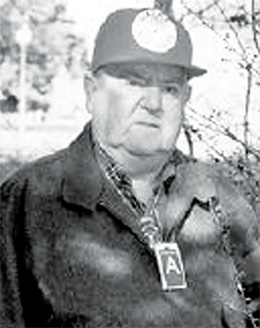
The Pavestone Company is hosting several ICPI Certification courses from September to January 2005, with some in Spanish. These two-day courses are aimed at company owners, job superintendents, forepersons, supervisors and crew leaders. The following topics are included: basic material estimating, paver installation, job layout, soil classification, documenting job costs, soil compaction, base material compaction, edge restraints and bedding sand. For more information go to www.pavestone.com

Halka Nurseries, which is celebrating its 50th anniversary this year, is mourning the founder, Chester Halka Sr., who passed away Sept. 11 at the age of 80 at the Monroe Village Healthcare Center in New Jersey.
Halka Nurseries is one of the few farmers of mature trees in the U.S., with tens of thousands of trees on on1,250-acres in Millstone, New Jersey and thousands of others on a farm in Cumberland County. His trees are planted all over the country, including at the White House and on the grounds of the Statue of Liberty.
Mr. Halka, born in South River, New Jersey, was a resident of Millstone the last 38 years. He served in the Army during WW II in the South Pacific. He received lifetime achievement awards from the New Jersey Nursery and Landscape Association and the Massachusetts Horticultural Society. Halka enjoyed traveling and the polka.
He had three brothers and four sisters. Two sisters, Irene Livak and Sally Masley, survive him. He also leaves behind his wife, Elsie Halka; a son and daughter-in-law, Chet Jr. and Bonnie; a daughter and son-in-law, Jan and Thomas Waters; and nine grandchildren.
In lieu of flowers, the family requests donations to Fox Chase Cancer Center, 7701 Burholme Ave., Philadelphia, PA 19111. Source: Asbury Park Press of New Jersey
On July 17, Trees for Mt. Lemmon planted approximately 400 ponderosa pine and Douglas fir seedlings in efforts to reforest private land damaged in last summer’s Aspen Fire near Tucson. Each tree was planted with two one-quart cartons of Rain Bird irrigation supplement. Rain Bird has donated 800 quarts of the supplement, a time-released water in gel form that aids in establishing native plant material where permanent irrigation is not available. Its use increases survival rates of transplants by providing continuous moisture for an extended period of time.
Trees for Mt. Lemmon will also plant an additional 400 trees that will be watered by permanent irrigation.
“We’re happy to be able to play a role in the reforestation efforts at Mt. Lemmon,” said Gurmeet Singh, Rain Bird product manager. “It’s very gratifying to be able to reach out to our local community.”
The city of Dallas has increased water ordinance requirements for automatic irrigation systems. It is now mandatory that all systems, including existing systems, have both rain and freeze sensors installed prior to Jan. 1. Previously, any system installed in 2002 or later was required to have the devices. In making this ruling, Dallas Water Utilities cited both increased water savings and reduced repairs due to freezing. The utility recommends homeowners contact an irrigation professional to determine if their system is in compliance and, if not, to make the necessary upgrades. As an incentive, Dallas will offer rebates to help offset a portion of the cost of retrofitting the system to bring it into compliance. A homeowner will receive a water bill credit of up to $50 if the unit is installed by a professional. If a homeowner elects to make the installation themselves, the city will provide a free rain and freeze sensor.
Source: The Irrigation Association
Beginning this summer, Georgia residents must follow outdoor water use schedules during drought and non-drought periods. The State Board of Natural Resources adopted new rules designed to get Georgians to continuously manage outdoor water use. “Population growth, combined with inevitable periods of drought, makes water conservation more important than ever,” says Carol Couch, director of the Environmental Protection Division. Water providers must begin enforcing the new rules by Aug. 1. Some local governments will begin enforcement immediately, while others must adopt new ordinances to implement and enforce the rules. Local jurisdictions are free to adopt more stringent requirements. Under current conditions, the non-drought schedule for outdoor water use will be in effect statewide. Should conditions worsen, outdoor water restrictions would increase for each of four levels of declared drought. Restrictions range from daily time limits to a total ban on outdoor water use.
Under the non-drought schedule, people with odd-numbered addresses may water on Tuesdays, Thursdays and Sundays, and those with even-numbered or unnumbered addresses may water on Mondays, Wednesdays and Saturdays. There are no mandatory hourly limitations.
Source: The Irrigation Association.

California legislators have approved a measure that could pave the way for more restrictive irrigation rules. Called Assembly Bill 2717, the legislation directs the state’s water advisory council to draw up a list of water-saving steps, which could be implemented at a later date.
“We’re looking for more efficient use of irrigation water,” said Clyde Macdonald, a staff member for Assemblyman Laird. The bill directs the California Urban Water Conservation Council (CUWCC) to explore water-saving steps that could force irrigation in urban landscape settings to meet more efficient standards.
Literature supplied by Laird’s office suggests the council look at standards for irrigation equipment, water budgets for irrigated landscapes, training standards and price incentives.
Macdonald said the council would focus on automated sprinkler control and grading standards to minimize runoff. Significant savings to the state’s limited water supply would be the payoff if basic rules to limit runoff were enforced, he said.
“Every evening you can float a kayak down the gutter,” observed Macdonald about his Sacramento neighborhood. “People don’t take into consideration how much water runs off the lawn and straight down the gutter.”
Landscape contractors, architects, and maintenance supervisors are invited to join the council and offer input.
More information is available at www.cuwcc.org or by calling Assemblyman Laird’s office at (916) 319-2027.
A recent Arizona Supreme Court ruling gives the Arizona Department of Water Resources flexibility in how it imposes water conservation mandates.
The court ruled that the state water resources department can require regional water providers to meet water conservation standards rather than imposing conservation programs directly on water users. The ruling came in a lawsuit filed in 1990 by the Arizona Water Co., which said it was put in a bind between conflicting mandates to encourage conservation by the water resources department and to meet customers’ needs by the Arizona Corporation Commission. The water provider argued it was up to the water resources department to create and implement programs to encourage end-users to conserve.
A lower court had agreed with Arizona Water Co., but the state Supreme Court ruled in June that the water resources department was acting within the state’s 1980 groundwater law when it set conservation standards for the provider, expecting the provider to encourage its customers to conserve.
Source: The Irrigation Association.
1949 – Year the Irrigation Association was established.
1990 – Year the Irrigation Association’s water conservation policy was adopted.
Source: The Irrigation Association
